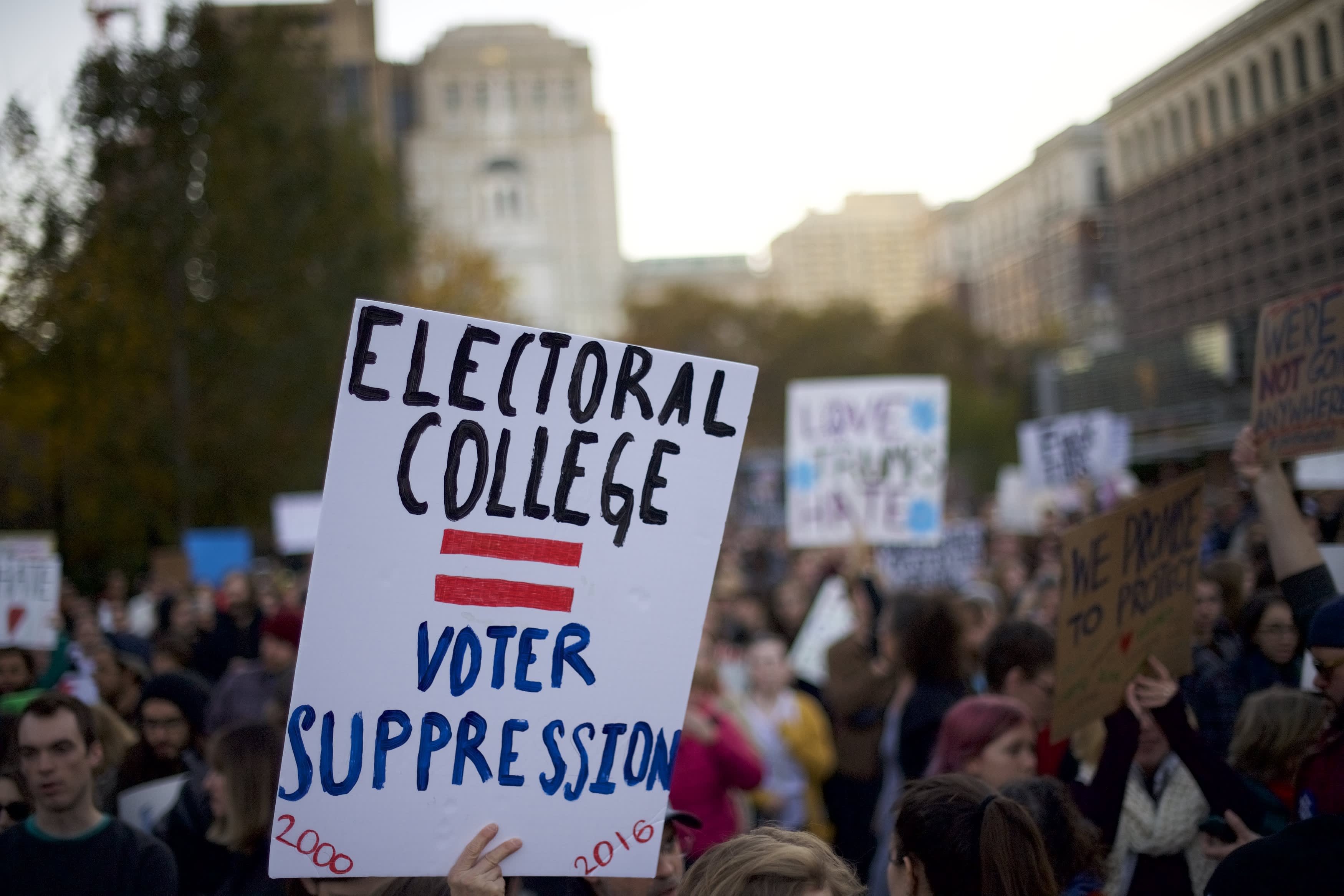Protesters demonstrate against President-elect Donald Trump outside Independence Hall November 13, 2016 in Philadelphia, Pennsylvania.
Mark Makela | Getty Images
States can require Electoral College voters to back the victor of their state’s popular vote, the Supreme Court ruled unanimously on Monday, in a major dispute that could have an impact on November’s presidential contest.
Justice Elena Kagan, who authored the opinion of the court, wrote that “nothing in the Constitution expressly prohibits States from taking away presidential electors’ voting discretion.”
Kagan wrote that the Constitution gives states “broad power over electors” and “electors themselves no rights.”
“Early in our history, States decided to tie electors to the presidential choices of others, whether legislatures or citizens. Except that legislatures no longer play a role, that practice has continued for more than 200 years,” Kagan wrote.
Kagan’s opinion was joined by all of her fellow justices except for Justice Clarence Thomas, who sided with the majority for different reasons.
Two cases were brought by Electoral College voters in Washington state and Colorado who refused to back Democrat Hillary Clinton in 2016, despite her wins in those states. In both cases, the Democratic electors were mounting last-ditch efforts to prevent President Donald Trump from taking office after it was apparent that he had won enough votes to carry the election.
Under the complex rules that govern American elections, it is the vote of the Electoral College that ultimately determines the winner of the presidency.
Virtually every state — besides Maine and Nebraska — allocates all of its Electoral College representation to electors who have committed to vote for the winner of the state popular vote. And most states, including Washington and Colorado, have laws that require electors to vote for their pledged candidate. The electors who brought the two cases argued that the enforcement of those laws was unconstitutional.
Micheal Baca, the Colorado elector, was replaced before he could cast his vote for former Ohio Gov. John Kasich. Three Washington electors were hit with $1,000 fines after voting for former Secretary of State Colin Powell.
Lower courts divided on the issue, with courts in Colorado and Washington ultimately coming down on opposite sides. The federal appeals court in Colorado sided with Baca, while the Washington Supreme Court sided with the state and upheld the fines.
The Supreme Court’s action on Monday affirmed the Washington court’s decision and reversed the Colorado decision. Justice Sonia Sotomayor recused herself from the Colorado case.
Thomas, joined in part by Justice Neil Gorsuch, wrote separately to express different reasons for his vote. Rather than find that the Constitution grants states power over electors, Thomas wrote that the Constitution was silent on the matter.
“When the Constitution is silent, authority resides with the States or the people,” Thomas wrote.
While “faithless electors” have never affected the outcome of a presidential race, such an outcome was plausible in a future contest, attorneys for the electors told the justices. Larry Lessig, an attorney for the Washington electors, said in court papers that a swing of just 10 electors would have been enough to alter the results of five previous presidential races.
For that reason, the lawyers asked the top court to resolve the matter ahead of the November election between Trump and presumptive Democratic nominee Joe Biden, the former vice president.
Lessig, in a statement released after the opinion was announced, said that “regardless of the outcome, it was critical to resolve this question before it created a constitutional crisis.”
“We have achieved that. Obviously, we don’t believe the Court has interpreted the constitution correctly. But we are happy that we have achieved our primary objective — this uncertainty has been removed. That is progress,” Lessig said.
Jason Harrow, who represented Baca, said that while “we don’t think the Supreme Court correctly interpreted the Constitution, at least we know whether laws that bind electors can be enforced in the upcoming election.”
Jena Griswold, the Colorado secretary of state, wrote in a post on Twitter that the “unanimous decision by the Supreme Court ensures that Americans’ voices will be heard in the Presidential election. We must fight all attempts to suppress voters and any corruption in our elections.”
Washington Attorney General Robert Ferguson said in a statement that the court had reaffirmed “the fundamental principle that the vote of the people should matter in choosing the President.”
“If we had not been successful, many observers, including several justices, noted the upcoming elections could have been thrown into ‘chaos,'” Ferguson wrote.
The Washington case is Chiafalo v. Washington, No. 19-465. The Colorado case is Colorado Department of State v. Baca, No. 19-518.
